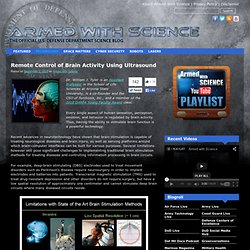

Mind-Reading Experiment Reconstructs Movies in Our Mind. The approximate reconstruction (right) of a movie clip (left) is achieved through brain imaging and computer simulation.UC Berkeley It sounds like science fiction: While volunteers watched movie clips, a scanner watched their brains.

And from their brain activity, a computer made rough reconstructions of what they viewed. Scientists reported that result Thursday and speculated such an approach might be able to reveal dreams and hallucinations someday. In the future, it might help stroke victims or others who have no other way to communicate, said Jack Gallant, a neuroscientist at the University of California, Berkeley, and co-author of the paper. He believes such a technique could eventually reconstruct a dream or other made-up mental movie well enough to be recognizable. People shouldn't be worried about others secretly eavesdropping on their thoughts in the near future, since the technique requires a person to spend long periods in an MRI machine, he noted. Scientists Read Dreams. By Mo Costandi of Nature magazine Scientists have learned how to discover what you are dreaming about while you sleep.

A team of researchers led by Yukiyasu Kamitani of the ATR Computational Neuroscience Laboratories in Kyoto, Japan, used functional neuroimaging to scan the brains of three people as they slept, simultaneously recording their brain waves using electroencephalography (EEG). The researchers woke the participants whenever they detected the pattern of brain waves associated with sleep onset, asked them what they had just dreamed about, and then asked them to go back to sleep. This was done in three-hour blocks, and repeated between seven and ten times, on different days, for each participant. During each block, participants were woken up ten times per hour. Perchance to dream Most of the dreams reflected everyday experiences, but some contained unusual content, such as talking to a famous actor. But the extra effort will be worth it, he says. This Creepy App Isn’t Just Stalking Women Without Their Knowledge, It’s A Wake-Up Call About Facebook Privacy [Update.
This app is meant to all be in good fun, but it's potentially a weapon in the hands of stalkers.

“Boy, you sure have a lot of apps on your phone.” “Well, it’s my job.” “What’s your favorite?” “Oh, I couldn’t choose. But hey, want to see one to set your skin crawling?” It was the flush end of a pleasurably hot day — 85 degrees in March — and we were all sipping bitter cocktails out in my friend’s backyard, which was both his smoking room, beer garden, viticetum, opossum parlor and barbecue pit. “Girls Around Me? She turned to our friends, apologetically. “He’s become obsessed with this app. I sputtered, I nevered, and I denied it, but it was true.
It’s an app that can be interpreted many ways. And more than anything, it’s a wake-up call about privacy. The only way to really explain Girls Around Me to people is to load it up and show them how it works, so I did. The splash screen elicited laughter all around. “Okay, so here’s the way the app works,” I explained to my friends.
The Government Can Track You by Your Cell Phone Without a Warrant. Do you support Truthout's reporting and analysis?

Click here to help fund it this week! (Photo: Runs With Scissors; Edited: JR / TO)Should police and the government be able to track you by your cell phone GPS without obtaining a search warrant? A federal appeals court appears to believe so, and recently ruled that tracking suspected criminals by their cell phones is similar to tailing their car or tracking their scent with police dogs. Civil liberties groups say the broad ruling, handed down by the Sixth Circuit Court of Appeals in Ohio, could have sweeping impacts on the Fourth Amendment privacy rights of the innocent as well as those suspected of crimes.
The case involves alleged marijuana trafficker Melvin Skinner, who was busted with 1,100 pounds of pot after a complicated Drug Enforcement Administration (DEA) investigation that involved tracking Skinner's movements by his prepaid cell phone for three days. Remote Control of Brain Activity Using Ultrasound Dr.

William J. Tyler is an Assistant Professor in the School of Life Sciences at Arizona State University, is a co-founder and the CSO of SynSonix, Inc., and a member of the 2010 DARPA Young Faculty Award class. Every single aspect of human sensation, perception, emotion, and behavior is regulated by brain activity. Thus, having the ability to stimulate brain function is a powerful technology. Recent advances in neurotechnology have shown that brain stimulation is capable of treating neurological diseases and brain injury, as well as serving platforms around which brain-computer interfaces can be built for various purposes.
For example, deep-brain stimulating (DBS) electrodes used to treat movement disorders such as Parkinson’s disease require neurosurgery in order to implant electrodes and batteries into patients. A portion of our initial work has been supported by the U.S. How can this technology be used to provide our nation’s Warfighters with strategic advantages?